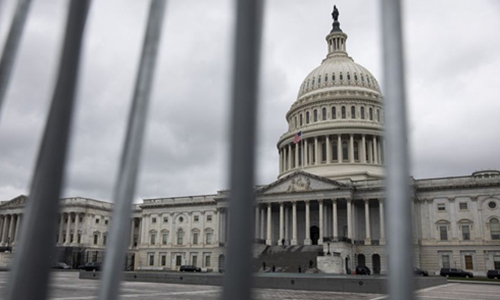US is destroying itself and world through erratic moves: Global Times editorial
Source: Global Times Published: 2020/7/7 22:58:40

Photo taken on March 25, 2020 shows the US Capitol in Washington D.C., the US. Photo: Xinhua
Washington has almost destroyed the cooperation-centered major-power relations and is pushing the world back to confrontation between major powers.
The global geopolitical struggle has apparently become an irreversible trend. This will have a profound influence on the nature of international relations, fundamentally disturb globalization, and lead to undesirable consequences.
The US is too indulged in using geopolitical means to cope with challenges and pursuing its own interests. Following the disintegration of the former Soviet Union, Russia hoped to integrate into the Western world, but the US pulled geopolitical levers and imposed the most intense strategic pressure on Russia. As NATO expanded eastward, it not only incorporated all countries of the Warsaw Pact and the Baltic states, but also extended its hand to the Commonwealth of Independent States, such as Georgia and Ukraine, eventually prompting Russia to have no other options but to take countermeasures.
Now, the US is using its extreme geopolitical tools on China. It is making the ideological conflict with China more extreme, because it is the cheapest means to mobilize its allies against China. It supports all countries that have territorial disputes with China, incites them to adopt a hard-line approach toward China, and smears China's foreign cooperation to overthrow the world order. It aims to worsen China's external environment, and make people in other countries less willing to cooperate with China.
The world has to pay for Washington's ambition to strengthen its hegemony. What the US advocates is not simply decoupling from China, but urging the Western world and more countries to side with the US amid its clashes with China, and to contain China. China is the largest trading partner of more than 100 countries, and has a market almost as big as that of the US. The US not only stabbed China, but the current global cooperative system as well.
The world will suffer long-lasting costs. The ongoing COVID-19 pandemic is just the first wave. In the face of the raging pandemic, the US has blocked international cooperation. It has only two perspectives on the anti-virus fight - one from the upcoming presidential elections, and the other from international geopolitics. Its lack of a scientific perspective has become the biggest obstacle to international cooperation.
It is not hard to imagine that if China and the US, together with all major powers, join hands and coordinate strategies, the COVID-19 pandemic could have been much less severe than it is now, and the global economy could resume in a more orderly manner.
The US policy that favors major-power confrontation will surely drag down global economic growth, which will force countries to consume their own resources. Coupled with the destructive impact of the pandemic, global economic prosperity after the Cold War is, perhaps, coming to an end. The world will lose huge employment. The global economy will become politicized, and the concept of national security would play a leading role in irrelevant sectors such as the economy.
An arms race and intimidation will return to international relations. Age-old contradictions will be reinforced in the loss of a world order. Favorable opinions toward each other's society will be reduced. The passion for studying and traveling abroad will cool down. The lives of many people will change.
Unfortunately, those geopolitical maniacs in the US are ending the "good old days" since the end of the Cold War. We are likely to enter a new era with more hatred and the menace of war. Major countries would become more nervous, and the prosperity of small countries would become fragile. The US political elite behind such changes are bound to be shamed by history.
Posted in: EDITORIAL